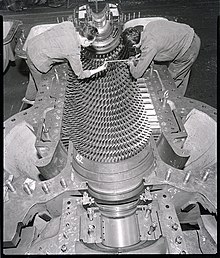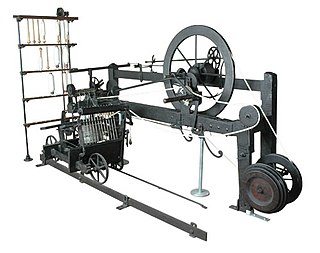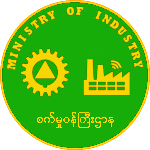
The following outline is provided as an overview of and topical guide to industrial machinery:

The following outline is provided as an overview of and topical guide to industrial machinery:

Mass production, also known as flow production or continuous production, is the production of substantial amounts of standardized products in a constant flow, including and especially on assembly lines. Together with job production and batch production, it is one of the three main production methods.

A factory, manufacturing plant or a production plant is an industrial facility, often a complex consisting of several buildings filled with machinery, where workers manufacture items or operate machines which process each item into another. They are a critical part of modern economic production, with the majority of the world's goods being created or processed within factories.

Automation describes a wide range of technologies that reduce human intervention in processes, namely by predetermining decision criteria, subprocess relationships, and related actions, as well as embodying those predeterminations in machines. Automation has been achieved by various means including mechanical, hydraulic, pneumatic, electrical, electronic devices, and computers, usually in combination. Complicated systems, such as modern factories, airplanes, and ships typically use combinations of all of these techniques. The benefit of automation includes labor savings, reducing waste, savings in electricity costs, savings in material costs, and improvements to quality, accuracy, and precision.

Mechanization is the process of changing from working largely or exclusively by hand or with animals to doing that work with machinery. In an early engineering text a machine is defined as follows:
Every machine is constructed for the purpose of performing certain mechanical operations, each of which supposes the existence of two other things besides the machine in question, namely, a moving power, and an object subject to the operation, which may be termed the work to be done. Machines, in fact, are interposed between the power and the work, for the purpose of adapting the one to the other.

A refinery is a production facility composed of a group of chemical engineering unit processes and unit operations refining certain materials or converting raw material into products of value.

Packaging is the science, art and technology of enclosing or protecting products for distribution, storage, sale, and use. Packaging also refers to the process of designing, evaluating, and producing packages. Packaging can be described as a coordinated system of preparing goods for transport, warehousing, logistics, sale, and end use. Packaging contains, protects, preserves, transports, informs, and sells. In many countries it is fully integrated into government, business, institutional, industrial, and personal use.

Industrial wastewater treatment describes the processes used for treating wastewater that is produced by industries as an undesirable by-product. After treatment, the treated industrial wastewater may be reused or released to a sanitary sewer or to a surface water in the environment. Some industrial facilities generate wastewater that can be treated in sewage treatment plants. Most industrial processes, such as petroleum refineries, chemical and petrochemical plants have their own specialized facilities to treat their wastewaters so that the pollutant concentrations in the treated wastewater comply with the regulations regarding disposal of wastewaters into sewers or into rivers, lakes or oceans. This applies to industries that generate wastewater with high concentrations of organic matter, toxic pollutants or nutrients such as ammonia. Some industries install a pre-treatment system to remove some pollutants, and then discharge the partially treated wastewater to the municipal sewer system.

A machine shop or engineering workshop is a room, building, or company where machining, a form of subtractive manufacturing, is done. In a machine shop, machinists use machine tools and cutting tools to make parts, usually of metal or plastic. A machine shop can be a small business or a portion of a factory, whether a toolroom or a production area for manufacturing. The building construction and the layout of the place and equipment vary, and are specific to the shop; for instance, the flooring in one shop may be concrete, or even compacted dirt, and another shop may have asphalt floors. A shop may be air-conditioned or not; but in other shops it may be necessary to maintain a controlled climate. Each shop has its own tools and machinery which differ from other shops in quantity, capability and focus of expertise.

Elliott Company designs, manufactures, installs, and services turbo-machinery for prime movers and rotating machinery. Headquartered in Jeannette, Pennsylvania, Elliott Company is a wholly owned subsidiary of the Japan-based Ebara Corporation, and is a unit of Elliott Group, Ebara Corporation's worldwide turbomachinery business. Elliott Group employs more than 2000 employees worldwide at 32 locations, with approximately 900 in Jeannette.

Cooper-Bessemer refers to the Cooper-Bessemer Corporation and the Cooper-Bessemer brand of industrial engines and compressors, manufactured in Mount Vernon, Ohio. The Cooper-Bessemer Corporation was formed when C. & G. Cooper and the Bessemer Gas Engine Company merged in 1929. In 1965, the company was renamed to Cooper Industries and relocated to Houston, Texas. In the 1990s, Cooper Industries' Petroleum and Industrial Equipment Group was spun off to become Cooper Cameron Corporation, known as the Compression Systems group of Cameron International Corporation. Cooper Machinery Services is the current original equipment manufacturer for Cooper-Bessemer engines.

Agricultural machinery relates to the mechanical structures and devices used in farming or other agriculture. There are many types of such equipment, from hand tools and power tools to tractors and the countless kinds of farm implements that they tow or operate. Diverse arrays of equipment are used in both organic and nonorganic farming. Especially since the advent of mechanised agriculture, agricultural machinery is an indispensable part of how the world is fed. Agricultural machinery can be regarded as part of wider agricultural automation technologies, which includes the more advanced digital equipment and robotics. While agricultural robots have the potential to automate the three key steps involved in any agricultural operation, conventional motorized machinery is used principally to automate only the performing step where diagnosis and decision-making are conducted by humans based on observations and experience.

The productivity-improving technologies are the technological innovations that have historically increased productivity.
The following outline is provided as an overview of and topical guide to production:

A rotary union is a union that allows for rotation of the united parts. It is thus a device that provides a seal between a stationary supply passage and a rotating part to permit the flow of a fluid into and/or out of the rotating part. Fluids typically used with rotary joints and rotating unions include various heat transfer media and fluid power media such as steam, water, thermal oil, hydraulic fluid, and coolants. A rotary union is sometimes referred to as a rotating union, rotary valve, swivel union,rotorseal, rotary couplings, rotary joint, rotating joints, hydraulic coupling, pneumatic rotary union, through bore rotary union, air rotary union, electrical rotary union, or vacuum rotary union

Packaging machinery is used throughout all packaging operations, involving primary packages to distribution packs. This includes many packaging processes: fabrication, cleaning, filling, sealing, combining, labeling, overwrapping, palletizing.

The Ministry of Industry is a ministry in the Government of Myanmar that produces consumer products such as pharmaceuticals and foodstuffs, textiles, ceramics, paper and chemical products, home utilities and construction materials, assorted types of vehicles, earth-moving equipment, diesel engines, automotive parts, turbines and generators, CNC machines, transformers, agricultural machines, rubber and tires, etc.

The machine industry or machinery industry is a subsector of the industry, that produces and maintains machines for consumers, the industry, and most other companies in the economy.
Automation engineering is the provision of automated solutions to physical activities and industries.

The Ministry of Heavy Industries is an executive agency of the Government of India. The Ministry entails for promoting the engineering industry viz. machine tools, heavy electrical, industrial machinery, and auto industry and administration of 29 operating CPSEs and 4 autonomous organizations.